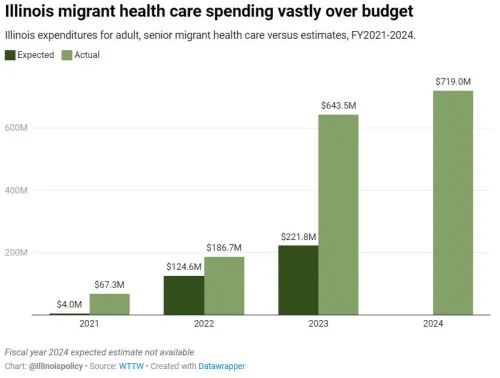Illinois Migrant Aid to Exceed $2.5 Billion by 2025, Sparking Demands for Transparency and Oversight
As Illinois prepares to surpass $2.5 billion in spending on migrant care by the end of 2025, lawmakers, watchdog groups, and taxpayers are raising urgent questions about how the money is being used—and who’s accountable.

Governor J.B. Pritzker’s administration has led one of the most expansive migrant support operations in the nation, providing emergency shelter, food, healthcare, education, and resettlement services for tens of thousands of asylum seekers—most of whom were bussed from Texas starting in 2022.
But as the tab grows, so does the scrutiny.
Where the Money Is Going
The projected $2.5 billion includes:
-
$500 million in shelter and hotel expenses
-
Over $400 million for healthcare and vaccinations
-
Tens of millions earmarked for education programs in Chicago-area schools
-
Funding for case workers, legal assistance, and transitional housing
Much of the funding is flowing through the Illinois Department of Human Services, which works with nonprofits and private contractors to deliver aid.
Calls for Transparency
State Republicans and several Democratic lawmakers are calling for greater oversight.
“Taxpayers deserve to know where every dollar is going,” said Illinois Senate Minority Leader John Curran. “This can’t be a blank check.”
A bipartisan group is now pushing for a formal audit by the Illinois Auditor General and the creation of a public-facing spending dashboard to track how funds are allocated.
Meanwhile, some advocacy groups say the state has acted too slowly to get aid where it’s needed most—especially in winter shelters and school readiness.
Governor Pritzker’s Response
Pritzker defends the spending as both morally necessary and economically manageable.
“We are a welcoming state, and these funds are helping people survive and rebuild their lives,” he said during a recent press conference. “We are also following all financial disclosure laws.”
Still, the administration is under pressure to show exactly how nonprofits and vendors are chosen, how money is tracked, and how long support will continue.
What’s Next?
With more buses expected to arrive in the summer and no clear federal resolution in sight, Illinois may soon be forced to allocate additional funds—or risk scaling back its response. A legislative hearing on migrant aid expenditures is tentatively scheduled for July.


Comments are closed, but trackbacks and pingbacks are open.